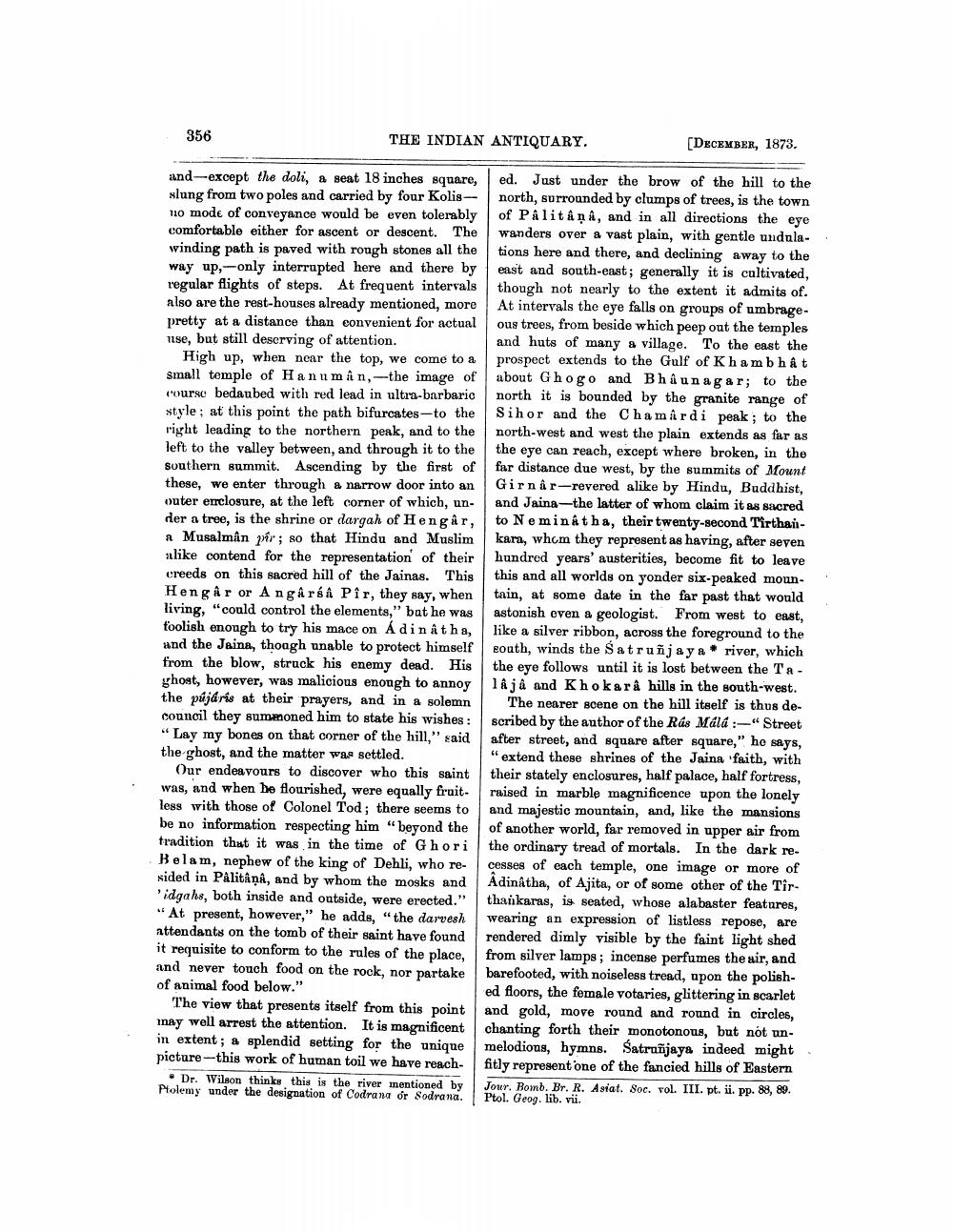________________
356
THE INDIAN ANTIQUARY.
[DECEMBER, 1873.
and-except the doli, a seat 18 inches square, ed. Just under the brow of the hill to the Nlung from two poles and carried by four Kolis-- north, surrounded by clumps of trees, is the town no mode of conveyance would be even tolerably of Pálitâna, and in all directions the eye comfortable either for ascent or descent. The wanders over a vast plain, with gentle undulawinding path is paved with rough stones all the tions here and there, and declining away to the way up,-only interrupted here and there by | east and south-east; generally it is cultivated, regular flights of steps. At frequent intervals though not nearly to the extent it admits of. also are the rest houses already mentioned, more At intervals the eye falls on groups of umbragepretty at a distance than convenient for actual ous trees, from beside which peep out the temples use, but still deserving of attention.
and huts of many & village. To the east the High up, when near the top, we come to a prospect extends to the Gulf of Khambhật small temple of Hanuman,--the image of about Ghogo and Bha unagar; to the course bedaubed with red lead in ultra-barbaric north it is bounded by the granite range of style ; at this point the path bifurcates-to the Sihor and the Chamardi peak; to the right leading to the northern peak, and to the north-west and west the plain extends as far as left to the valley between, and through it to the the eye can reach, except where broken, in the southern summit. Ascending by the first of far distance due west, by the summits of Mount these, we enter through a narrow door into an Girnar-revered alike by Hindu, Buddhist, outer errclosure, at the left corner of which, un. and Jaina--the latter of whom claim it as sacred der a tree, is the shrine or dargah of Hengår, to Neminátha, their twenty-second Tirthana Musalman pir; so that Hindu and Muslim karn, whom they represent as having, after seven ulike contend for the representation of their hundred years' austerities, become fit to leave Creeds on this sacred hill of the Jainas. This this and all worlds on yonder six-peaked mounHengår or A ngârsâ Pir, they say, when tain, at some date in the far past that would living, "could control the elements," bat he was astonish even a geologist. From west to east, foolish enough to try his mace on Adinatha, like a silver ribbon, across the foreground to the and the Jaina, thoagh unable to protect himself Bouth, winds the Satruñjaya • river, which from the blow, struck his enemy dead. His the eye follows until it is lost between the Taghost, however, was malicious enough to annoy 1 & ja and Khokara hills in the south-west. the pájaris at their prayers, and in a solemn The nearer scene on the hill itself is thus decouncil they summoned him to state his wishes: scribed by the author of the Rás Málá :-"Street "Lay my bones on that corner of the hill," said after street, and square after square," he says, the ghost, and the matter was settled.
"extend these shrines of the Jaina 'faith, with Our endeavours to discover who this saint their stately enclosures, half palace, half fortress, was, and when he flourished, were equally fruit- raised in marble magnificence upon the lonely less with those of Colonel Tod; there seems to and majestic mountain, and, like the mansions be no information respecting him "beyond the of another world, far removed in upper air from tradition that it was in the time of Ghori the ordinary tread of mortals. In the dark reBelam, nephew of the king of Dehli, who re- cesses of each temple, one image or more of sided in Pálitânî, and by whom the mosks and Adinatha, of Ajita, or of some other of the Tîr. 'idgahs, both inside and outside, were erected." thaikaras, is seated, whose alabaster features, "At present, however," he adds, "the darvesh wearing an expression of listless repose, are attendants on the tomb of their saint have found rendered dimly visible by the faint light shed it requisite to conform to the rules of the place, from silver lamps; incense perfumes the air, and and never touch food on the rock, nor partake barefooted, with noiseless tread, upon the polishof animal food below."
ed floors, the female votaries, glittering in scarlet The view that presents itself from this point and gold, move round and round in circles, may well arrest the attention. It is magnificent chanting forth their monotonous, but not unin extent ; a splendid setting for the unique melodions, hymns. Satruñjaya indeed might picture ---this work of human toil we have reach fitly represent one of the fancied hills of Eastern
• Dr. Wilson think this is the river mentioned by Ptolemy under the designation of Codrana or Sodrana. Ptol. Goog. lib. vii.




